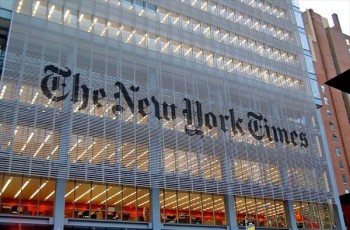
(Credit: Wikipedia)
It was “regrettable” that the New York Times called Michael Brown, the 18-year-old killed by a police officer in Ferguson, Missouri earlier this month, “no angel,” Times public editor Margaret Sullivan wrote today.
“Many” readers complained over the phrase, used in a Monday story by John Eligon about Brown. The article said:
“Michael Brown, 18, due to be buried on Monday, was no angel, with public records and interviews with friends and family revealing both problems and promise in his young life.”
Calling Brown “no angel” suggested he was “a bad kid,” Sullivan wrote. The Times‘ writer, Eligon, said “I wish I would have changed” the phrase, opting for a different phrase like “wasn’t perfect.”
“He agreed that ‘no angel’ was not a good choice of words and explained that they were meant to play off the opening anecdote of the article in which Mr. Brown saw an angelic vision,” Sullivan reported. That vision was when Brown told his father and stepmother that he saw an angel being chased by Satan “and the angel running into the face of God” earlier this year.
Sullivan said Eligon, who is black, said he had “experienced apparent racial profiling” and wanted to show a fuller picture of Brown. Eligon’s article reported that Brown “dabbled in drugs and alcohol” but also that he had plans for a career:
“He lived in a community that had rough patches, and he dabbled in drugs and alcohol. He had taken to rapping in recent months, producing lyrics that were by turns contemplative and vulgar. He got into at least one scuffle with a neighbor.”
(Sullivan noted readers also questioned why his rapping was incuded as a suggestion rapping is bad and that the reporter said he didn’t think rapping is “indicative of someone’s character.”)
The article also reported that he graduated high school and “was pointed toward a trade school and a career and, his parents hoped, toward a successful life.”
Eligon interviewed Brown’s mother saying “he wasn’t in a gang” but may have been friends with people who were because “he could just get along with anybody.” The article mentioned his hobby of playing video games, planning to get a job and his school’s athletic director saying Brown was “the most serious of that class about getting out of Normandy, about graduating.”
Both Sullivan and the Times national editor Alison Mitchell argued
“There was certainly no hint that this poor young man should have been shot,” which some readers thought the article suggested
Mitchell also told the Washington Post’s Erik Wemple: “I think, actually, we have a nuanced story about the young man and if it had been a white young man in the same exact situation, if that’s where our reporting took us, we would have written it in the same way.”
In addition to the “blunder” of calling Brown “no angel,” Sullivan said ” the timing of the article (on the day of Mr. Brown’s funeral) was not ideal.” Plus, the Times also ran a profile of Darren Wilson, the police officer who fatally shot Brown, next to Brown’s profile. That “seemed to inappropriately equate the two,” she wrote. See below a detail of the front-page, via Newseum.
Likewise the Root, which identifies itself as “a digital magazine that provides thought-provoking commentary and news from a variety of black perspectives,” called today “the most inappropriate time to lambaste the slaim teenager.”
Vanity Fair collected examples of other times the Times has called people “no angel.” They include Al Capone, James “Whitey” Bulger, gang leader Donald Manuel Paradis, Larry Flint, and Columbine school shooter Eric Harris.
Below, check out tweets under the #noangel hashtag.
St. Louis NBC-affiliate KSDK apologized earlier this month after showing the police officer Wilson’s home on TV, as iMediaEthics wrote at the time.

.JPG)





